|
 |
Home
» Ukrainians in Canada Ukrainians in Canada
10.02.2013
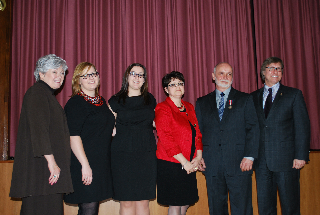 Another incredibly deserving member of the Ukrainian-Canadian community in Toronto is the most recent recipient of not one, but two prestigious government awards. On Sunday, January 20th, amid family, friends and colleagues, Peter Kardasz received both the Etobicoke Centre Community Recognition Award and the Queen Elizabeth II Diamond Jubilee Medal for his exemplary service in the Ukrainian Canadian community. Mr. Kardasz, President of the League of Ukrainian Canadians (Etobicoke/Mississauga branch), is a very active member of the community. His involvement in the Ukrainian Youth Association (CYM), the Baturyn Concert Marching Band, the Taras Shevchenko Ukrainian Community Centre, and the Ukrainian Canadian Congress spans decades, including instilling the value of community to his two daughters... Another incredibly deserving member of the Ukrainian-Canadian community in Toronto is the most recent recipient of not one, but two prestigious government awards. On Sunday, January 20th, amid family, friends and colleagues, Peter Kardasz received both the Etobicoke Centre Community Recognition Award and the Queen Elizabeth II Diamond Jubilee Medal for his exemplary service in the Ukrainian Canadian community. Mr. Kardasz, President of the League of Ukrainian Canadians (Etobicoke/Mississauga branch), is a very active member of the community. His involvement in the Ukrainian Youth Association (CYM), the Baturyn Concert Marching Band, the Taras Shevchenko Ukrainian Community Centre, and the Ukrainian Canadian Congress spans decades, including instilling the value of community to his two daughters...
|
Detailed...
|
13.01.2013
The Canadian Conference in Support of Ukraine (CCSU) congratulates all the distinguished recipients of the Queen Elizabeth’s II Diamond Jubilee Medal, and wishes them still greater personal and professional success and further accomplishments for the good of the Ukrainian Canadian community and Canada.
Orest Steciw, Toronto
On November 28, 2012, Mr Orest Steciw joined the ranks of Canadians who were awarded with Queen Elizabeth’s Diamond Jubilee Medal. Mr. Steciw, a professional educator, who has distinguished himself for his dedicated community activism and leadership, is currently National President of the League of Ukrainian Canadians and President of Ucrainica Research Institute. The medal was presented to Mr. Steciw at Queen’s Park by the Speaker of the Legislative Assembly of Ontario the Honourable Dave Levac, who... |
Detailed...
|
13.01.2013
Alexander Motyl, professor of political science at Rutgers University, delivered the Annual Ukrainian Famine Lecture at the University of Toronto on 9 November. His address, titled “The Holodomor and History: Bringing Ukrainians Back In,” was particularly notable for its call to add a human dimension to the study of the Holodomor and of Ukrainian history overall. Professor Motyl began by stating that he had gained a considerably broader appreciation of the Ukrainian Famine of 1932–33 as a result of editing a sourcebook on the topic, The Holodomor Reader (CIUS Press, 2012), with Dr. Bohdan Klid of the University of Alberta. The two scholars, in fact, came upon the idea for such a publication separately in... |
Detailed...
|
13.01.2013
On this solemn day Canadians gather together country wide with feelings of pride, respect and gratitude toward those who have laid down their lives in defence of Canada. Soldiers, sailors, airmen and women, who have served and continue to serve our country, are given reverence to uphold the memory of their efforts. For generations Canadian military personnel have dedicated themselves for the protection of Canadian fundamental values and rights. Today, as every year, Canadians pay tribute to the sacrifice these individuals have made in order to uphold peace and freedom around the world. As Ukrainian Canadians we also remember and pay homage to the millions of men and women who fought and too often perished for the freedom of their Ukrainian homeland. "We remember and commemorate all the Canadians who... |
Detailed...
|
26.12.2012
There is no argument that the Holodomor of 1932 to 1933 is one of the greatest atrocities ever faced by a nation, and thus it is a shame that the members of the general international community are unaware of this devastating, man-made famine that took the lives of millions of Ukrainians. Literally translated, “Holodomor” is a Ukrainian term meaning “murder by starvation.” During these years of the famine, every other nation of the Soviet Union experienced population growth while Ukraine lost millions of lives. This evidence most basically points to the policy of collectivization and the consequent famine as a maneuver of genocide against the Ukrainian nation as opposed to having been established for economic reasons. Today, the efforts to raise awareness of this tragic genocide against the Ukrainian nation are stronger than ever, and hopefully the entire international community will soon recognize the cruel injustice that was the Holodomor. A brief examination of the history of the time preceding the famine is necessary in order to wholly understand the causes of the Holodomor. Before achieving independence in 1991, the Ukrainian people had always been under foreign rule. In the late nineteenth century, the Russian Empire dominated the Ukrainian territory – the breadbasket of Europe – with oppressive policies banning any educational or Ukrainian cultural expression. However... |
Detailed...
|
26.12.2012
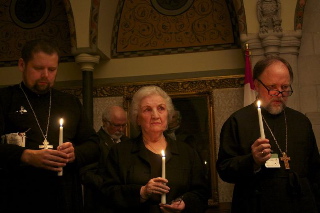 On Thursday November 22nd, as part of National Holodomor Awareness Week, the Ukrainian Canadian Congress (UCC) in cooperation with the Canada-Ukraine Parliamentary Friendship Group (CUPFG) and the Embassy of Ukraine in Canada held a solemn commemoration on the occasion of the seventy-ninth anniversary of the Ukrainian Holodomor of 1932-33 on Parliament Hill. The Holodomor was one of the most heinous crimes in the history of mankind, the result of a deliberate plan by Stalin to subjugate Ukrainians and destroy the Ukrainian nation. For over seventy years the Soviet regime concealed the truth and misled the West in the hope that its memory would be lost forever. The service on Parliament Hill was led in prayer by: Very Reverend Dr. Father Peter Galadza of the Metropolitan Andrey Sheptytsky Institute in Ottawa, Very Reverend Father Ihor Okhrimtchouk of Assumption of the Blessed Virgin Ukrainian Orthodox Cathedral in Ottawa; and Very Reverend Dr. Ihor Kutash of St. Mary's the Protectress Ukrainian Orthodox Church in Montreal. UCC President Paul Grod spoke on behalf of the... On Thursday November 22nd, as part of National Holodomor Awareness Week, the Ukrainian Canadian Congress (UCC) in cooperation with the Canada-Ukraine Parliamentary Friendship Group (CUPFG) and the Embassy of Ukraine in Canada held a solemn commemoration on the occasion of the seventy-ninth anniversary of the Ukrainian Holodomor of 1932-33 on Parliament Hill. The Holodomor was one of the most heinous crimes in the history of mankind, the result of a deliberate plan by Stalin to subjugate Ukrainians and destroy the Ukrainian nation. For over seventy years the Soviet regime concealed the truth and misled the West in the hope that its memory would be lost forever. The service on Parliament Hill was led in prayer by: Very Reverend Dr. Father Peter Galadza of the Metropolitan Andrey Sheptytsky Institute in Ottawa, Very Reverend Father Ihor Okhrimtchouk of Assumption of the Blessed Virgin Ukrainian Orthodox Cathedral in Ottawa; and Very Reverend Dr. Ihor Kutash of St. Mary's the Protectress Ukrainian Orthodox Church in Montreal. UCC President Paul Grod spoke on behalf of the...
|
Detailed...
|
26.12.2012
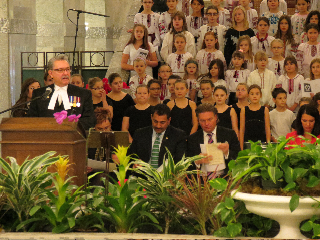 On November 20, 2012 at noon in the rotunda of Alberta’s Legislature Building, Albertans came together to honour those who perished in the tragic 1932-1933 famine-genocide of the Ukrainian people under Soviet rule. This tragic event was marked with a very solemn remembrance on the 4th anniversary of the coming into force of Alberta’s Ukrainian Famine and Genocide (Holodomor) Memorial Day Act. The Act recognizes the Holodomor and institutes a memorial day in Alberta to mark this tragedy every 4th Saturday in November annually. The very moving commemoration mourned the victims of the atrocity of the manmade famine-genocide which took place in Ukraine 1932-1933. Hosted by the Honourable Gene Zwozdesky, MLA, Speaker of the Legislative Assembly of Alberta and sponsor of the Act in 2008, and Ms. Genia Leskiw, MLA Bonnyville-Cold Lake, Chair of the Advisory Council on Alberta Ukraine Relations, it brought together members of the government, the Ukrainian community and On November 20, 2012 at noon in the rotunda of Alberta’s Legislature Building, Albertans came together to honour those who perished in the tragic 1932-1933 famine-genocide of the Ukrainian people under Soviet rule. This tragic event was marked with a very solemn remembrance on the 4th anniversary of the coming into force of Alberta’s Ukrainian Famine and Genocide (Holodomor) Memorial Day Act. The Act recognizes the Holodomor and institutes a memorial day in Alberta to mark this tragedy every 4th Saturday in November annually. The very moving commemoration mourned the victims of the atrocity of the manmade famine-genocide which took place in Ukraine 1932-1933. Hosted by the Honourable Gene Zwozdesky, MLA, Speaker of the Legislative Assembly of Alberta and sponsor of the Act in 2008, and Ms. Genia Leskiw, MLA Bonnyville-Cold Lake, Chair of the Advisory Council on Alberta Ukraine Relations, it brought together members of the government, the Ukrainian community and
|
Detailed...
|
11.11.2012
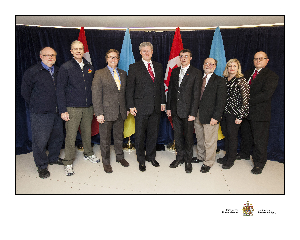 Efforts by Ukrainian researchers and academics to restore Ukraine’s historical memory and national identity was the focus of a tour by Ruslan Zabily involving six North American universities, nine Ukrainian communities and meetings with high ranking government officials. Ruslan Zabily is Director of the National Museum Memorial to the Victims of Occupation Regimes "Prison at Lonsky” in Lviv, Ukraine. The now Museum was used as a prison by the NKVD-KGB and Gestapo. It held political prisoners, innocent men, women and, even, children - Poles, Jews and, mostly, Ukrainians. Today, it is a prestigious government museum, memorial and research institution. The two week tour in October 2012 was sponsored by the member organizations of the Canadian Conference in Support of Ukraine (CCSU): League of Ukrainian Canadians (LUC), League of Ukrainian Canadian Women (LUCW), Ukrainian Youth Association of Canada (CYM), Society of Veterans of UPA, and... Efforts by Ukrainian researchers and academics to restore Ukraine’s historical memory and national identity was the focus of a tour by Ruslan Zabily involving six North American universities, nine Ukrainian communities and meetings with high ranking government officials. Ruslan Zabily is Director of the National Museum Memorial to the Victims of Occupation Regimes "Prison at Lonsky” in Lviv, Ukraine. The now Museum was used as a prison by the NKVD-KGB and Gestapo. It held political prisoners, innocent men, women and, even, children - Poles, Jews and, mostly, Ukrainians. Today, it is a prestigious government museum, memorial and research institution. The two week tour in October 2012 was sponsored by the member organizations of the Canadian Conference in Support of Ukraine (CCSU): League of Ukrainian Canadians (LUC), League of Ukrainian Canadian Women (LUCW), Ukrainian Youth Association of Canada (CYM), Society of Veterans of UPA, and... |
Detailed...
|
11.11.2012
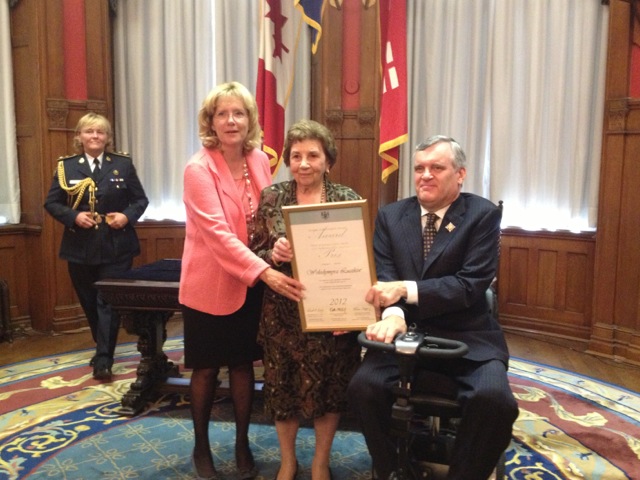 Wolodymyra Luczkiw has been a dedicated volunteer in the Canadian Ukrainian community for over 50 years. Wolodymyra is very proud of her Ukrainian heritage and has spent many years with the Ukrainian Canadian Research and Documentation Centre and the Ukraine Heritage Museum. She believes strongly that history needs to be remembered and preserved for future generations. In her community, Wolodymyra is known for her warmth and compassion to both the people she works with and those she cares for. She approaches everything she does with a true sense of dedication and diligence and is a... Wolodymyra Luczkiw has been a dedicated volunteer in the Canadian Ukrainian community for over 50 years. Wolodymyra is very proud of her Ukrainian heritage and has spent many years with the Ukrainian Canadian Research and Documentation Centre and the Ukraine Heritage Museum. She believes strongly that history needs to be remembered and preserved for future generations. In her community, Wolodymyra is known for her warmth and compassion to both the people she works with and those she cares for. She approaches everything she does with a true sense of dedication and diligence and is a... |
Detailed...
|
11.11.2012
Following the collapse of the Communist system in Central and Eastern Europe and the dissolution of the USSR, Ukraine and other countries of the former socialist camp ended up in identical starting positions with respect to the creation of a democratic society. However, in each of these countries this process evolved according to a particular scenario. Above all, the need emerged to find a path toward the reconciliation of two different groups in society: those who had waged a struggle against Soviet totalitarianism and those who had served it. On the whole, the process of overcoming the consequences of Soviet totalitarianism in the countries of Central and Eastern Europe is taking place according to the following scenario: condemnation of the Soviet (Communist) regime, the creation of special bodies to deal with questions of national memory, the publication of socially significant information on the activities of the Communist punitive-repressive system (considered a state secret until recently), political lustration, the popularization of liberation movements, the creation of a new European identity, and... |
Detailed...
|
|
|
| NEW NAME OF BUDUCHNIST CREDIT UNION |
|
|
|
|




